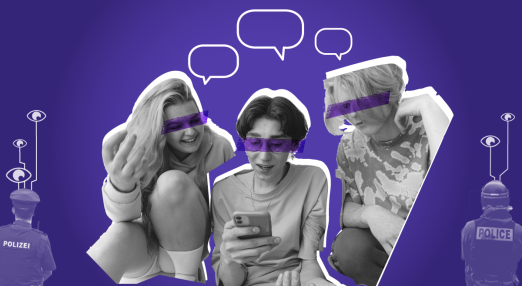Open internet and inclusive technology
New digital technology and the internet brought with it a promise of equal access to knowledge, openness and connection. Their ubiquity has brought opportunity for progress. However, access to digital technology is vastly unevenly distributed. Technology, especially when relying on artificial intelligence, location and biometric data, can amplify social, racial and environmental injustices. We work to bring back the original purpose of an open internet and enable inclusive, sustainable technologies that work for all and for the greater good.
Filter resources
-

How to fight Biometric Mass Surveillance after the AI Act: A legal and practical guide
The EU's Artificial Intelligence Act has been adopted, laying out an in-principle ban on live mass facial recognition and other public biometric surveillance by police. Yet the wide exceptions to this ban may pave the way to legitimise the use of these systems. This living guide, for civil society organisations, communities and activists, charts a human rights-based approach for how to keep resisting biometric mass surveillance practices now and in the future
Read more
-

EDRi-gram, 2 May 2024
Last week, the European Parliament was doing everything everywhere all at once in the run up to the final plenary before the June EU elections. Let’s run through some of the highlights. In a disappointing move that will endanger medical secrecy, the European Parliament passed the European Health Data Space (EHDS). This law will expose everyone’s medical records to unnecessary security and privacy risks in the name of research and “innovation”. The Parliament also took its final step on the much touted Artificial Intelligence (AI) Act last week. With the final version of the law full of loopholes and missed opportunties, we’re left to contend with how to keep advocating for the protection of peope’s rights and fight against biometric mass surveillance. We also directed our attention towards the European Commission’s concerning decision to allow unrestricted data flows to Israel. Together with Access Now and 11 other civil society groups, we wrote to the Commission to ask for clarity on this decision.
Read more
-

EDRi-gram, 17 April 2024
But what knocked everyone's socks off was the massive victory in Greece, where EDRi member Homo Digitalis' strategic complaint led to a record-breaking fine to the Ministry of Asylum and Migration for violating people's data protection rights in its border management systems KENTAUROS and HYPERION. This news from Greece, immediately followed by the European Parliament's vote on the European Union's asylum system (EURODAC), makes it irrefutable that the Migration Pact is the EU's attempt to codify in law surveillance practices that not only gravely harm the rights of migrants but which are illegal.
Read more
-

EDRi-gram, 3 April 2024
After our light-hearted April Fool’s edition, it’s time to get down to brass tacks. In this issue, we delve into the European Court of Justice’s landmark decision declaring the EU regulation on fingerprint IDs invalid—a significant victory. We’re also peeling back the layers of the Artificial Intelligence Act, offering you an in-depth look at the legislation’s intricacies and its implications for your digital rights. Furthermore, we shine a spotlight on the concerning trends in surveillance expansion and disinformation spread across Eastern partnership countries.
Read more
-

Win against Facebook. Giant not allowed to censor content at will
By blocking the accounts and groups of Społeczna Inicjatywa Narkopolityki (SIN, the Civil Society Drug Policy Initiative), Meta has infringed on the organization’s personal rights. A Polish court issued a watershed decision in a case supported by the Panoptykon Foundation, thereby confirming that Internet platforms cannot block users at will.
Read more
-

EDRi-gram, 20 March 2024
On March 13, following years of tireless advocacy, the EU Parliament finally passed the Artificial Intelligence (AI) Act. But there’s not much to celebrate – the law missed the mark when it comes to protecting our human rights, especially those of migrants and people on the move. On the same day, the Parliament also passed the European Media Freedom Law (EMFA) which aims to protect journalists and media workers. Another legislation with lofty ambitions that did not live up to its goals. Despite the Brussels spyware scandal that shocked up in February 2024, EU’s approach to surveillance technology remains lackadaisical at best. What will finally convince them to take action?
Read more
-

EDRi-gram, 06 March 2024
On 17 February, one of the landmark digital laws, the Digital Services Act, in the European Union came fully into force. Now, you've got a whole bunch of fantastic online rights at your fingertips. But don't worry, we've got your back! Our friends at Bits of Freedom have whipped up a shiny new website packed with easy-peasy actions to help you understand and flex those digital rights muscles like a pro. But wait, there's more! We're thrilled to introduce you to our new Head of Policy, Ella Jakubowska. Ella takes up this role from her previous EDRi position as Senior Policy Advisor, where she led advocacy on facial recognition, the confidentiality of online communications, age verification and more. She’ll be spending the coming months listening and learning, so please get in touch if you’d like to talk all things digital rights policy.
Read more
-

#PrivacyCamp24: Event summary
On January 24, 2024, we brought together policymakers, activists, human rights defenders, and academics from all over Europe for Privacy Camp 2024. We came together to explore the theme ‘Revealing, Rethinking, and Changing Systems’.
Read more
-

Civil society complaint raises concern that LinkedIn is violating DSA ad targeting restrictions
On 26 February, EDRi and its partners Global Witness, Gesellschaft für Freiheitsrechte and Bits of Freedom have submitted a complaint to the European Commission regarding a potential infringement of the Digital Services Act (DSA).
Read more
-

EDRi-gram, 21 february 2024
In this edition, we share with you our concerns about the Irish media regulator’s Online Safety Code and the sledgehammer approach of age verification tools. Also, earlier this month, the EU Parliament voted on the agreement on automated data exchange for police cooperation, known as ‘Prüm II’. What does this framework, and the broader securitisation mindset it represents, mean for our fundamental rights?
Read more
-

EDRi-gram, 7 february 2024
In this edition of the EDRi-gram, we'll be discussing the Irish Media Regulator's proposal to implement mandatory age verification that could impact all EU Member States. This could be a dangerous move that will impact millions of people using platforms like YouTube or Instagram. Additionally, after three years of negotiations, the EU Council voted on the Artificial Intelligence (AI) Act last week. Our civil society AI coalition has summarised the latest updates on this landmark legislation and what's at stake.
Read more
-

Irish Media Regulator must address dangerous age verification in its new online safety code
On 30 January 2024, EDRi submitted its comments on the Irish Media Regulator’s (Coimisiún na Meán) new Online Safety Code in a public consultation, highlighting significant concerns about age verification.
Read more
